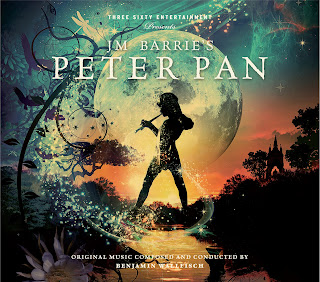Dreaming of Neverland
 |
| J.M. Barrie's PETER PAN** |
Every
once in a while, I wake from a dream and remember the strange place I have been
visiting. It is only familiar in those
vaporous moments between sleep and wakefulness. A peculiar house is there with white peeling paint, a spiral staircase
that leads up to a room with walls made of glass, and views of the island in
every direction. I remember in that
moment that I have been there before. I
remember Neverland.
If
I were still a child, I would know better than to rub the sleep from my eyes. It breaks the magic of memory. The only way to return (if only in my dreams)
is after a childlike day – perhaps spent at Disneyland, wearing mouse ears and
eating cotton candy – or building living room forts with my children. It absolutely cannot return unless licorice
has been consumed and something odd has been worn as a hat.
But
grownups like me forget the important things so easily. We must, if we are to be respected. This is why George Darling could never
remember.
I
wonder, then, how J.M. Barrie held on to his memories of Neverland – at least long
enough to write them down so that we could read Peter Pan with a sense of puzzled wonder, (or, if we are too much
like Mr. Darling, with enough conviction to utter: “Poppycock!”) Perhaps it helped that he sometimes laid his
manuscript aside to teach Michael to ride a bike, Peter to bowl and little
George to cast a fishing line.*
Neverlands
vary a great deal, of course, but it is Barrie himself who reminds us that
“Neverland is always more or less an island.”
Mine is always dotted with quizzical architecture. John’s had a lagoon and he lived there in a
boat turned upside down, while Michael lived in a wigwam. We all know that Wendy lived in a house of
leaves, sewn so deftly together that wind could not find its way inside, for
all that it tried.
I
think Wendy is the key to the whole question of when we begin to forget. My daughter is exactly her age, and I am touched
by sadness as I watch the child struggle with the woman. I wonder if she will one day – like Wendy –
hear a voice inside her crying: “Woman, woman, let go of me!” It hasn’t happened yet. The girl part of her is still strongest,
especially at night when the nightlights are lit and she, like any other girl,
cannot resist the hope that tonight, it won’t be just a winking light, but an
actual fairy visiting her room.
It
is the disappointment of this hope that is the beginning of the end. Fairies very rarely appear, and when they do,
they are usually disappointing, being as Lilliputian in heart as Tink. (A fairy’s
petty nature may be why they are rumored to be distant kin to the Lilliputians,
but I find no evidence of common lineage.)
When
an adolescent girl stops looking for fairies, she sighs and tucks away other
hopes as well. After that, she loses her
dreams bit by bit until a woman stares back at her in the mirror. Some dreams she gives away as kisses and
thimbles, hopeful of love. One she saves
forever.
But
a girl can’t help being sensible when it comes right down to it. Even Peter admitted that. Wendy knew she would one day grow up, just as
she understood Peter never could. But,
oh, how she longed to stay with him in Neverland! She never gave up this hopeless longing, but
made a secret of it, which her husband and children later saw on the corner of
her mouth: the hidden kiss that only belonged to Peter.
I’m
afraid that Barrie’s memories of Neverland did not stay with him until the end
of the book. Perhaps he fell asleep
after writing chapter fifteen and recklessly rubbed sleep from his eyes when he
woke. We find him rather grown up in
chapter sixteen, taking the side of Mr. and Mrs. Darling and slandering the
children as selfish brats who, when finding the nursery window open on their
return, got more than they deserved.
Losing
Neverland made him sad enough to write wistfully: “On these magic shores,
children at play are forever beaching their coracles. We too have been there:
we can still hear the sound of the surf, though we shall land no more.”
But
I still want to row to shore. And sometimes,
when I lay down at night, a secret expectation is hidden in the corner of my sleepy
smile. I hope for magic. I hope for just one more glimpse of
Neverland.
**To
purchase J.M. Barrie’s Peter Pan,
composed and conducted by Benjamin Wallfisch, follow this link: http://www.amazon.com/J-M-Barries-Peter-Pan/dp/B003PS9IWU/ref=sr_1_1?s=music&ie=UTF8&qid=1336532710&sr=1-1
"Dreaming of Neverland" is my addition to a trio of blog posts written to honor J.M. Barrie on the anniversary of his birth. I would like to offer my special thanks to Jen at literallyjen.com, for organizing this tribute. Read Jen's post here: http://www.literallyjen.com/2012/05/book-review-capt-hook-by-j-v-hart/. The third contributor was Melissa, whose post can be found here: http://kaleidoscopicreveries.blogspot.com/2012/05/happy-birthday-j-m-barrie.html



Oh, I love this! Peter Pan is one of my favorite stories! It captures childhood better than anything else, a modern mythology! Beautiful post!
ReplyDeleteThanks, Hailey!
DeleteBeautifully captured. This brought tears to my eyes. There is something so precious about childhood - a place we all live - that can only be revisited in dreams or memories. Thank you, J.M. Barrie, for creating a character, who will always live there, and for sharing him with us. Thank you, Jennifer Froelich, for the beautiful post!
ReplyDeleteThanks, Christy!
DeleteAWWWWW!! So sweet.
ReplyDeleteLove you, My Shell. <3
DeleteI absolutely adore your post! What a wonderful, imaginative bit of awesome. Thanks very much for sharing! (And thanks for sharing our links, too.) :)
ReplyDeleteThanks so much!
Delete